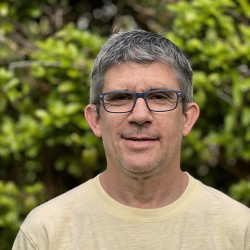
Buschiazzo, Alejandro
Research interests
1) Structural biology of signal transduction in bacteria (11/2006 - present)The general aim is to understand the mechanisms of bacterial signal transduction at the molecular level, with special emphasis on two-component systems from Bacillus subtilis and Leptospira spp. Our approach is strongly anchored in experimental and computational structural biology approaches to determine the three-dimensional structures of macromolecules at high resolution, in different functional states. We are interested in understanding the allosteric mechanisms of conformational rearrangement in proteins involved in signaling, as well as in protein:DNA complexes of regulatory complexes.
2) Study of the motility apparatus from Leptospira (03/2013 - present)
This line of research is focused on the study of the molecular architecture of the flagellar filament from Leptospira spp. Spirochetal flagella are unique in that the filament is confined to the periplasmic space between the two cell membranes (unlike what happens in "classical" Gram-negative bacterial models such as Escherichia or Salmonella, among others, in which the filament is typically extracellular, perforating the outer membrane). The periplasmic flagellum of spirochetes is essential for these bacteria to have normal translational motility, which is essential for virulence in pathogenic Leptospira species. The molecular bases that link this supramolecular structure to the cell body, allowing swimming movement, are still unknown. Our work has allowed us to demonstrate that the Leptospira filament is much more complex in its protein constitution than the flagella of better studied bacteria (in which the filament is made up of a single protein species, flagellin). It also shows a markedly asymmetric architecture, with sheath proteins arranged in a radially anisotropic manner, with some species populating the inner (concave) surface and others the outer (convex) surface. This line is being developed in collaboration with teams at other Institutes abroad, with whom we have obtained specific funding (Albert Ko and Charles Sindelar at Yale University, USA; Mathieu Picardeau at the Pasteur Institute, Paris).
Working area
I work as a research scientist in the field of Microbiology. My main goal is to understand the molecular mechanisms that underlie biological function of key proteins. A special interest is dedicated to pathogenicity determinants in Leptospira and other bacterial pathogens. The team I lead has a rather strong expertise in Structural Biology and Protein Biochemistry, dedicated to the study of bacterial signaling and regulation systems, as well as motility of Spirochetes. Our work has helped uncovering how proteins change their shape and conformation in very specific ways, enabling bacteria to sense their environment and internal milieu, triggering adaptive responses.Personal information
Email: alebus@pasteur.edu.uyORCID: 0000-0002-2509-6526
SCOPUS: 6602197569
CVUy: see
Institution: Instituto Pasteur de Montevideo
Other Institution: Institut Pasteur
Career at PEDECIBA
Biology Area
As researcher
| Motive | Start date | Minutes | |
|---|---|---|---|
| Investigador - Evaluación | Grado 5 | 02/10/2024 | View minutes |
| Investigador - Cambio de grado (evaluación) | Grado 5 | 01/11/2018 | View minutes |
| Investigador - Evaluación | Grado 4 | 01/11/2018 | View minutes |
| Investigador - Evaluación | Grado 4 | 17/09/2014 | View minutes |
| Investigador - Cambio de grado (evaluación) | Grado 4 | 04/12/2008 | View minutes |
| Investigador - Evaluación | Grado 3 | 04/12/2008 | View minutes |
| Investigador - Evaluación | Grado 4 | 08/11/2007 | View minutes |
| Investigador - Cambio de grado (evaluación) | Grado 3 | 08/11/2007 | View minutes |
| Investigador - Ingreso | Grado 4 | 06/07/2006 | View minutes |